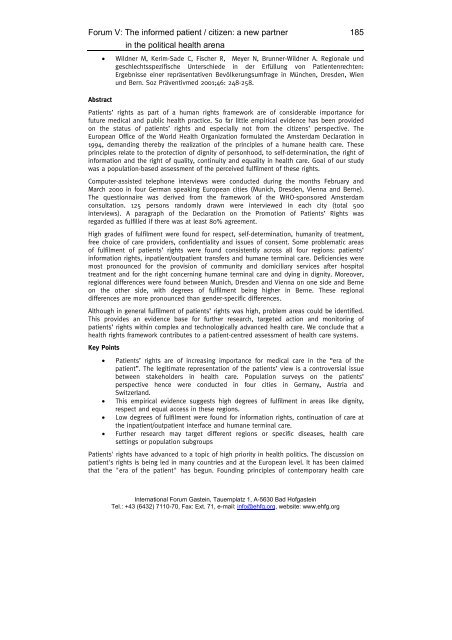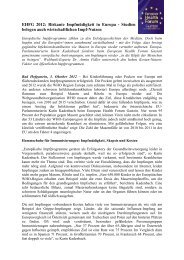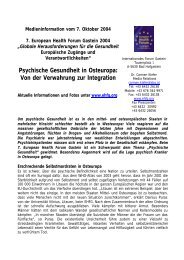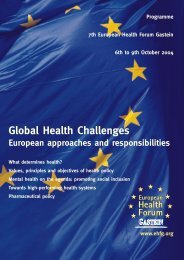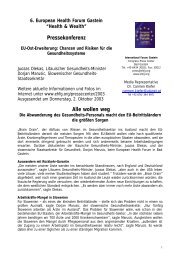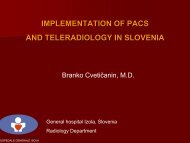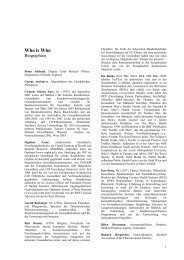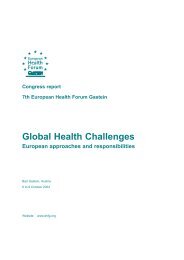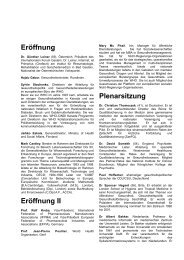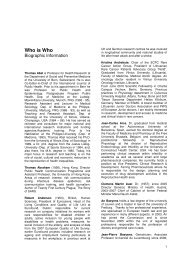Congress report - European Health Forum Gastein
Congress report - European Health Forum Gastein
Congress report - European Health Forum Gastein
Create successful ePaper yourself
Turn your PDF publications into a flip-book with our unique Google optimized e-Paper software.
<strong>Forum</strong> V: The informed patient / citizen: a new partner<br />
in the political health arena<br />
International <strong>Forum</strong> <strong>Gastein</strong>, Tauernplatz 1, A-5630 Bad Hofgastein<br />
Tel.: +43 (6432) 7110-70, Fax: Ext. 71, e-mail: info@ehfg.org, website: www.ehfg.org<br />
185<br />
• Wildner M, Kerim-Sade C, Fischer R, Meyer N, Brunner-Wildner A. Regionale und<br />
geschlechtsspezifische Unterschiede in der Erfüllung von Patientenrechten:<br />
Ergebnisse einer repräsentativen Bevölkerungsumfrage in München, Dresden, Wien<br />
und Bern. Soz Präventivmed 2001;46: 248-258.<br />
Abstract<br />
Patients’ rights as part of a human rights framework are of considerable importance for<br />
future medical and public health practice. So far little empirical evidence has been provided<br />
on the status of patients’ rights and especially not from the citizens’ perspective. The<br />
<strong>European</strong> Office of the World <strong>Health</strong> Organization formulated the Amsterdam Declaration in<br />
1994, demanding thereby the realization of the principles of a humane health care. These<br />
principles relate to the protection of dignity of personhood, to self-determination, the right of<br />
information and the right of quality, continuity and equality in health care. Goal of our study<br />
was a population-based assessment of the perceived fulfilment of these rights.<br />
Computer-assisted telephone interviews were conducted during the months February and<br />
March 2000 in four German speaking <strong>European</strong> cities (Munich, Dresden, Vienna and Berne).<br />
The questionnaire was derived from the framework of the WHO-sponsored Amsterdam<br />
consultation. 125 persons randomly drawn were interviewed in each city (total 500<br />
interviews). A paragraph of the Declaration on the Promotion of Patients’ Rights was<br />
regarded as fulfilled if there was at least 80% agreement.<br />
High grades of fulfilment were found for respect, self-determination, humanity of treatment,<br />
free choice of care providers, confidentiality and issues of consent. Some problematic areas<br />
of fulfilment of patients’ rights were found consistently across all four regions: patients‘<br />
information rights, inpatient/outpatient transfers and humane terminal care. Deficiencies were<br />
most pronounced for the provision of community and domiciliary services after hospital<br />
treatment and for the right concerning humane terminal care and dying in dignity. Moreover,<br />
regional differences were found between Munich, Dresden and Vienna on one side and Berne<br />
on the other side, with degrees of fulfilment being higher in Berne. These regional<br />
differences are more pronounced than gender-specific differences.<br />
Although in general fulfilment of patients’ rights was high, problem areas could be identified.<br />
This provides an evidence base for further research, targeted action and monitoring of<br />
patients’ rights within complex and technologically advanced health care. We conclude that a<br />
health rights framework contributes to a patient-centred assessment of health care systems.<br />
Key Points<br />
• Patients’ rights are of increasing importance for medical care in the “era of the<br />
patient”. The legitimate representation of the patients’ view is a controversial issue<br />
between stakeholders in health care. Population surveys on the patients’<br />
perspective hence were conducted in four cities in Germany, Austria and<br />
Switzerland.<br />
• This empirical evidence suggests high degrees of fulfilment in areas like dignity,<br />
respect and equal access in these regions.<br />
• Low degrees of fulfilment were found for information rights, continuation of care at<br />
the inpatient/outpatient interface and humane terminal care.<br />
• Further research may target different regions or specific diseases, health care<br />
settings or population subgroups<br />
Patients' rights have advanced to a topic of high priority in health politics. The discussion on<br />
patient's rights is being led in many countries and at the <strong>European</strong> level. It has been claimed<br />
that the "era of the patient" has begun. Founding principles of contemporary health care


